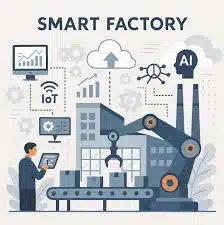
AI in Manufacturing: Smart Factories & Predictive Maintenance
Artificial Intelligence (AI) has transformed various industries, and manufacturing is no exception. In the era of Industry 4.0, smart factories powered by AI are revolutionizing traditional manufacturing processes. From predictive maintenance to quality control, AI is maximizing efficiency and minimizing downtime. This article delves into the role of AI in manufacturing, specifically focusing on smart factories and predictive maintenance.
The Rise of Smart Factories
Smart factories utilize AI-driven technologies to enhance automation, connectivity, and data exchange in manufacturing environments. These interconnected systems enable real-time monitoring and control of production processes, leading to improved productivity and cost savings. By integrating AI algorithms with robotics, sensors, and IoT devices, smart factories can optimize operations and adapt to dynamic production demands.
One of the key benefits of smart factories is the ability to collect and analyze vast amounts of data. AI algorithms can process this data to identify patterns, detect anomalies, and make data-driven decisions in real time. This data-driven approach enables manufacturers to streamline processes, reduce waste, and achieve higher levels of operational efficiency.
Predictive Maintenance: Preventing Downtime with AI
Predictive maintenance is a crucial application of AI in manufacturing that helps prevent equipment failures and unplanned downtime. By using machine learning algorithms to analyze historical data and sensor readings, manufacturers can predict when machines are likely to fail and schedule maintenance proactively. This predictive approach minimizes downtime, extends equipment lifespan, and reduces maintenance costs.
AI-enabled predictive maintenance systems can detect subtle changes in equipment performance that may indicate potential faults. By monitoring key parameters such as temperature, vibration, and energy consumption, AI algorithms can identify early warning signs of impending failures. This proactive maintenance strategy enables manufacturers to address issues before they escalate, ensuring continuous operations and optimizing asset performance.
Enhancing Quality Control and Productivity
AI technology also plays a critical role in improving quality control processes in manufacturing. By implementing computer vision systems and machine learning models, manufacturers can automate visual inspections, defect detection, and quality assurance tasks. AI-powered systems can identify defects more accurately and quickly than human inspectors, leading to higher product quality and reduced scrap rates.
Furthermore, AI-driven production planning and optimization algorithms help manufacturers optimize production schedules, resource utilization, and inventory management. By analyzing historical data, market trends, and production constraints, AI systems can generate actionable insights to improve production efficiency and meet customer demand more effectively. This data-driven approach enables manufacturers to adapt to changing market conditions and make informed decisions to drive business growth.
The Future of AI in Manufacturing
As AI continues to advance, the future of manufacturing will be increasingly driven by intelligent automation, predictive analytics, and data-driven decision-making. Smart factories empowered by AI technologies will enable manufacturers to achieve greater flexibility, agility, and productivity in a rapidly evolving landscape. By harnessing the power of AI for predictive maintenance, quality control, and process optimization, manufacturing companies can stay competitive and thrive in the digital age.
In conclusion, AI is reshaping the manufacturing industry by transforming traditional factories into intelligent, adaptive, and efficient production facilities. Smart factories powered by AI-driven technologies offer unprecedented opportunities to enhance productivity, quality, and profitability. With predictive maintenance and data-driven insights, manufacturers can unlock new levels of efficiency and reliability in their operations. Embracing AI in manufacturing is not just a trend but a strategic imperative for companies looking to succeed in the era of smart factories and Industry 4.0.